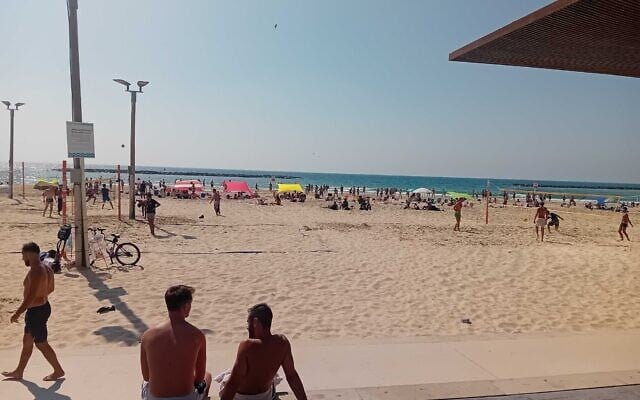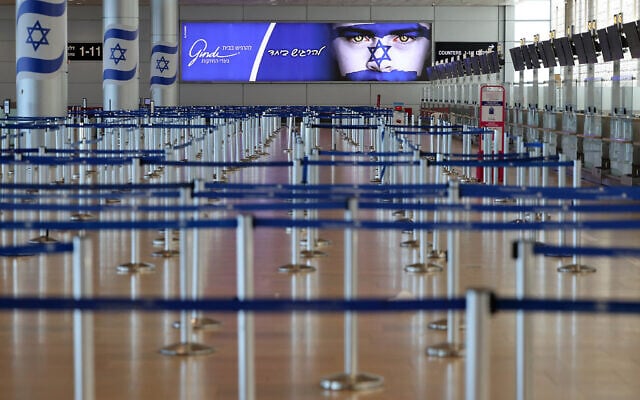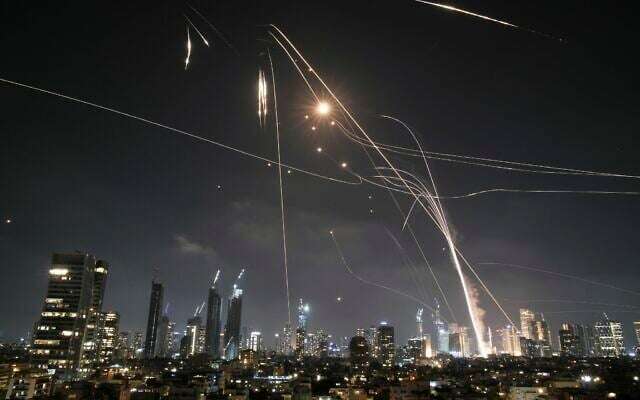



JTA — Just minutes after Shabbat began in Israel, sirens sounded, sending Israelis back to their shelters to await the next salvo in their country’s new war with Iran.
Roughly 100 missiles were on their way from Iran, officials warned, teeing up a repeat of an April 2024 attack that marked the first direct exchange of fire between the two countries. Soon, projectiles fell across the country’s center, injuring dozens of people.
Less than 24 hours had passed since Israel launched a dramatic and apparently successful strike against Iran, pummeling nuclear sites in multiple cities and assassinating a number of top military and nuclear leaders. Israelis had learned about the attack, which leaders said could go on for days, when sirens sounded in the middle of the night.
All day, Israelis had stayed close to home in accordance with guidance from the IDF’s Home Front Command. Large gatherings were canceled, including Tel Aviv’s iconic Pride celebration, and many rabbis urged people to stay home from synagogue over Shabbat. But stores bustled and in cities along the coastline, families snuck out to the beach during a period of calm.
“The second they said we could leave the area close to a protected space, we went with the kids to the sea,” Dalia Magnezi, a resident of Jaffa, told the Jewish Telegraphic Agency. “It was fun. But I prepared them that if there is a siren, what to do — to back against the wall.”
Magnezi’s family’s experience reflected a well-known dynamic in Israel, of seeking to carry on with regular life even amid rising tensions and fears. Videos of neighbors dancing in their buildings’ bomb shelters appeared on social media. A baby was born in a hospital that had moved all of its operations underground. And Pride celebrants found other ways to party.

“I just got back to the hotel from a spontaneous pool party that everybody remaining from the trip at the Sheraton put together,” Dillon Perez, in town from New York City on a Pride trip organized Jewish Federations of North America, said in the afternoon. “[A DJ] played pretty much all the songs that we would have heard at any of the Pride parties this weekend. We just did them at the pool.”
A picture posted on social media showed Caitlyn Jenner, the transgender US celebrity who was selected to helm Tel Aviv Pride, drinking wine in a hotel bomb shelter.
Beneath the bravado, though, unease had set in. The barrages of missiles ignited frightful scenes over central Israel, with explosions dotting the night sky and sending Israelis scurrying from their home safe rooms to more fortified bunkers in their buildings or neighborhoods.
The country’s airport was closed, with even its national carrier, El Al, famous for flying when other airlines will not, canceling all flights in the coming days and moving its fleet abroad. Anyone in the country was stuck. Anyone hoping to travel from overseas was stranded.

Alerts told Israelis they could leave their safe rooms but should not travel far from them. Already, the country’s most influential rabbis had exhorted Israelis to follow the instructions to avoid large gatherings, indoor and outside, until at least 8 p.m. on Saturday, a period covering Shabbat.
“While communal prayer represents an ideal, preserving life takes precedence over Shabbat observance,” Rabbi David Stav, who chairs the Tzohar rabbinical organization, told Israel Hayom.
In the diaspora, rabbis retooled their Shabbat plans to account for the wrenching scenes playing out in Israel. Some rewrote their sermons. Others announced that they would add new prayers and poems to their community’s liturgy, calling for peace, wisdom, and divine protection for those endangered by the war and carrying it out.

At the Reform congregation Temple Emanu-El in Manhattan, Senior Rabbi Josh Davidson said that he would draw on the week’s Torah portion, which describes Israel’s foes being vanquished, to advocate against those who might criticize Israel’s preemptive attack.
“I think that Israel’s detractors will no doubt challenge the legitimacy of the strike as the actions of a misguided Israeli government with which they already disagree over the war in Gaza and Israel’s own domestic agenda. And I want to strongly caution against such cynicism,” said Davidson. But he added, “I’ll say that even while I recognize the legitimacy of Israel’s military action, nonetheless, I pray it end quickly.”
Soon after, Iran sent a fresh barrage of missiles toward Israel. Sirens blared anew, and the sky lit up again with explosions. It was 1:30 a.m.
